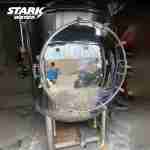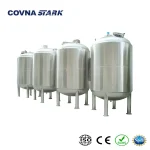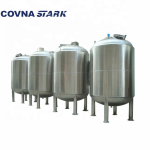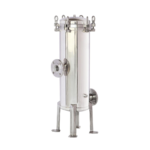Water Treatment Solutions for the Food and Beverage Industry
In the food and beverage industry, water is more than just a utility—it's a raw material, a cleaning agent, and a critical component of product safety. Whether used in direct formulation, equipment rinsing, or steam generation, water must meet strict hygiene standards to ensure compliance and consumer confidence.
Designing an effective water treatment system requires a deep understanding of process requirements, microbial control, and food-grade equipment standards. This article explores how industrial filtration, stainless steel water tanks, and integrated CIP systems can be optimized for modern food and beverage production facilities.
Key Water Treatment Challenges in the Food & Beverage Industry
Food and beverage manufacturers face unique challenges when it comes to water usage. Unlike general industrial water treatment, F&B water must meet stringent hygiene, safety, and regulatory requirements—including microbial control, chemical compatibility, and cross-contamination prevention.
Typical Challenges Include:
- Microbial Risk: Inadequate filtration or poor tank design can lead to biofilm growth, product contamination, and costly recalls.
- Varying Water Sources: Seasonal or municipal supply fluctuations can introduce inconsistent water quality that affects taste, shelf life, or equipment scaling.
- Compliance Requirements: Water systems must conform to standards like FDA, HACCP, and 3-A Sanitary for both equipment and contact water.
- Multiple Water Grades: Facilities often require different levels of treated water (potable, process, CIP, boiler feed), each with distinct filtration and storage needs.
- Cleaning System Integration: Poor compatibility between storage and CIP systems increases downtime and chemical waste.
Solving these issues requires a filtration and tank strategy designed not just for flow rate or cost—but for cleanliness, compliance, and operational efficiency.
Choosing the Right Filtration System for Hygienic Safety
In food and beverage production, filtration systems must do more than remove particles—they must uphold hygienic design principles, withstand frequent cleaning cycles, and prevent microbial growth. This makes filter type, housing material, and micron rating critically important.
Recommended Filter Types and Features:
- Stainless Steel Cartridge Filters: Ideal for fine filtration (1–10 μm) of process water. Sanitary housings with tri-clamp fittings are easy to clean and resistant to CIP chemicals.
- Bag Filters with Food-Grade Media: Suitable for high flow applications like bottle rinsing or utility water. Ensure filter bags are certified for food contact (FDA or EU-compliant).
- Inline Basket Strainers: Used as pre-filters to remove coarse particles before fine filtration or softening stages.
- UV or Absolute-Rated Filters: Deployed in pathogen-sensitive applications such as beverage blending or final rinse stages.
Look for filtration systems with crevice-free welds, electropolished surfaces, and 3-A sanitary certification. Poor design in housing or sealing can create dead zones that harbor bacteria—even in stainless systems.
Stainless Steel Storage Solutions for Potable & Process Water
Water used in food and beverage manufacturing must be stored with the same care as ingredients. Whether for potable supply, ingredient blending, or process buffering, hygienic stainless steel tanks are the industry standard for safe, contaminant-free water storage.
Key Design Features of Food-Grade Water Tanks:
- Material: SUS316L or SUS304 stainless steel for corrosion resistance and food-contact safety.
- Internal Finish: Mirror-polished or electropolished surfaces (Ra ≤ 0.4 μm) to minimize biofilm formation and support clean-in-place (CIP) cleaning.
- Tank Geometry: Sloped or conical bottoms with full drainability prevent residue accumulation and enable complete flushing.
- Ventilation: Sanitary breathing valves with 0.22 μm sterile filters protect stored water from airborne contamination.
- Instrumentation: Integration ports for level sensors, temperature probes, and cleaning validation access points.
These tanks are commonly deployed in:
ingredient mixing systems, water reuse lines, CIP loops, and final rinse stages. Their modular design also supports skid-based beverage and dairy processing units.
Supporting Clean-in-Place (CIP) Systems with Smart Design
Clean-in-place (CIP) systems are essential for maintaining hygiene in food and beverage processing environments. Filters and storage tanks must be CIP-compatible to ensure efficient cleaning without the need for disassembly or manual intervention.
What Makes a Tank or Filter CIP-Ready?
- CIP Spray Balls or Rotating Nozzles: Ensure 360° internal coverage to clean all surfaces without shadow zones.
- Electropolished Internal Surfaces: Reduce microbial adhesion and facilitate rapid, residue-free flushing.
- Sanitary Piping & Connections: Use of tri-clamp fittings and crevice-free welds to eliminate bacteria traps.
- Drainability: Design tanks and housings with sloped bottoms and fully accessible drains to prevent fluid retention.
- Automation Integration: CIP loops often rely on programmable logic controllers (PLCs) to manage cleaning cycles, temperature, and chemical dosing—so sensors and valves must support this logic.
When tanks and filters are designed with CIP in mind, cleaning becomes faster, more consistent, and more compliant. This directly reduces chemical waste, downtime, and labor costs—while improving product safety and batch consistency.
Conclusion: Build a Reliable, Compliant Water Infrastructure for F&B Plants
In the food and beverage industry, water quality directly impacts product integrity, equipment longevity, and regulatory compliance. Investing in a well-designed water treatment infrastructure—featuring sanitary-grade filters, corrosion-resistant tanks, and CIP-ready components—ensures not only hygiene but also operational efficiency.
STARK offers complete water treatment solutions tailored for F&B manufacturers, including:
- Stainless steel cartridge and bag filtration systems
- 316L hygienic water tanks with CIP capability
- Custom integration with CIP loops and PLC automation
Need help designing or upgrading your water system? Contact our engineering team for technical drawings, hygiene compliance advice, and product recommendations.





